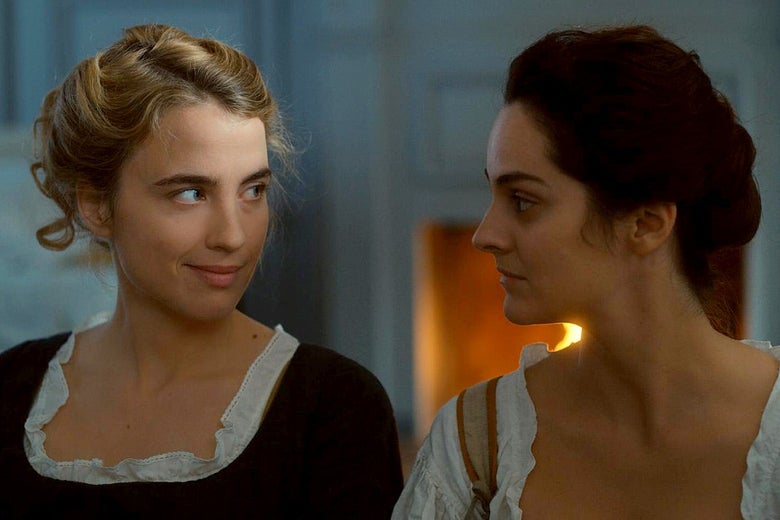Now that Céline Sciamma’s film has been tapped by the New York Film Critics Circle for Best Cinematography, you may be even more curious to find out just how good the movie is. Be assured: it is excellent in every way, from the unusually authentic acting, to the Pinteresque pauses that define the two principal characters’ dialogue; from the composition of the scenes, each one serving as a potential painting in itself; to the remarkable isolation of the scenery shot on location in the French province of Brittany. Sciamma follows up on her previous film “Tomboy” about a ten-year-old girl who presents herself to other children as a boy named Mikhael with her current entry, about two women who are not tomboys but who broaden their concept of sexuality in similar ways.
The title of the film is also that of a painting executed by Marianne (Noemie Merlant), and depicts the sexual awakening of a previously closeted woman who had spent her early years in a monastery. The action, which takes place in 1760, opens as a number of men row Marianne out to the island, complete with her painting gear—which she recovers when it had left the boat and is floating in the water by jumping right in and taking it back. Except for an additional segment of the film that shows bewigged men looking at paintings in a museum, there is no sign of masculinity to be found. This is strictly a study of women, focusing on the way that a liberated Marianne and an isolated woman about her age are ablaze with desire, though spending a fair amount of time before throwing off resistance to action.
How did this lesbian relationship begin? Marianne, who makes her living by receiving commissions from rich and titled women for portraits, shows up at the home of a countess (Valeria Golino), observing a portrait of her sponsor painted by Marianne’s father years back when the countess was a young woman. Yet the countess’ daughter Hèloise, having refused to sit for her own portrait, is reacting to the suicide of her sister who had been pledged by her mother to a rich Milanese man. To ease the way for Hèloise’s eventual surrender to the proposed painting, Marianne has been told to pretend she is merely a walking companion, during which time she understands that Hèloise is enraged by the thought of marriage to a man she had not met.
In a subplot, Sophie (Luana Bajrami), the housekeeper who does embroidery, is pregnant, desperate enough to abort the fetus to go to an abortionist who uses an undisclosed poison to separate the unborn from its mother.
Gratefully the soundtrack is almost bereft of music, the kind of distraction that ruins so many Hollywood movies whose directors do not trust their audience to know when to cry and when to feel joy. As the two women go about walks on the beach, heading back to the quarters to work on the portrait, they are filled with desire. Hèloise begins to ask Marianne whether she had ever “known love,” asks how it feels, and yes, succumbs to the mutual urges of the two women. Their tsunami of forbidden emotions is palpable, the two offering a shower of sparks to display their mutual love. At one point Hèloise even allows her dress to catch afire, taking her good time to put it out.
“Portrait” received not only a best cinematography award from the prestigious NY Film Critics Circle but has been blessed by a best screenplay citation at a Cannes Festival. Photography and screenplay and direction aside, nothing would have come of this film were it not for the passion of the two actresses evoking forbidden love at a time that might surprise moviegoers who believed that lesbianism was created in the 20th century.
121 minutes. © 2019 by Harvey Karten, Member, New York Film Critics Online
PORTRAIT OF A LADY ON FIRE (Portrait de la jeune fille en fej)
Neon
Reviewed for Shockya.com & BigAppleReviews.net linked from Rotten Tomatoes by: Harvey Karten
Director: Céline Sciamma
Screenwriter: Céline Sciamma
Cast: Noemi Merlant, Adele Haenel, Luana Bajrami, Valeria Golino
Screened at: Critics’ DVD, NYC, 12/4/19
Opens: December 6, 2019
Story – A-
Acting – A
Technical – A-
Overall – A-

